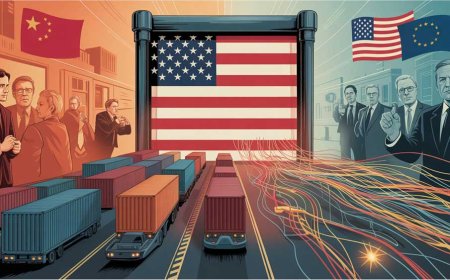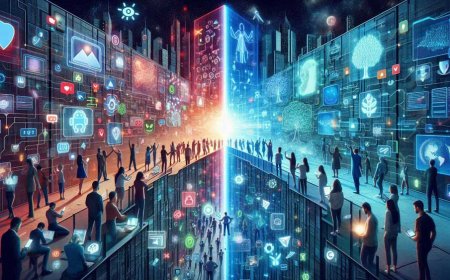From Steam to Algorithms: Why Sharism is the Compass for Our Phygital AI Era
The article explores the profound societal, cultural, and economic transformation driven by the convergence of AI, digitalization, and phygital interaction. It introduces Sharism as a new social philosophy for the Phygital AI era—emphasizing shared knowledge, collaborative innovation, and ethical technology use. Sharism is positioned as a cultural and strategic response to the failures of industrial capitalism, offering a vision for a more inclusive, intelligent, and human-centered future. Discover Sharism—a visionary philosophy for the Phygital AI era that champions shared knowledge, collaborative innovation, and digital inclusion. A new humanism for a world in transformation.

We are undoubtedly living through a historic transformation — unprecedented in scale — that is reshaping every level of society, across all industries, and throughout every corner of the world.
We live in an era of constant acceleration. The lines between physical and digital are vanishing, and technology is no longer just a tool — it has become the invisible infrastructure shaping how we think, work, create, connect, and even dream.
This transformation is not only technological — it is anthropological, with profound social and political implications. A new paradigm is emerging, with an impact that could rival — or even surpass — that of the Industrial Revolution.
Just as steam engines, electricity, and railways radically transformed society in the 18th and 19th centuries, today, algorithms, neural networks, blockchain, artificial intelligence, cybersecurity, and distributed systems are redefining every aspect of human existence.
But every revolution needs a compass — a shared vision to guide change.
In this context, the urgency emerges to define a new social philosophy capable of addressing today’s complex challenges — challenges that can no longer be tackled with frameworks inherited from the Industrial Revolution.
That’s where our proposal takes shape: Sharism.
From Steam to Algorithms: The New Raw Material Is Shared Knowledge
During the Industrial Revolution, machines replaced human labor. Manual work gave way to mechanization, and entire societies reorganized around factories. Cities boomed, economies globalized — but at a high cost: increasing inequality, alienation, labor exploitation, and environmental devastation.
Today, AI and digitalization are doing something similar with the human mind — automating thought, writing, and design. “Thought factories” are now digital platforms, cloud systems, and data centers. But at what cost, if wealth continues to concentrate in the hands of a few who exploit the aggregating — and often monopolistic — power of technological algorithms?
The new raw material is no longer coal or iron. It is information.
The Risks of Ignoring the Value of Sharing
If this digital revolution is driven solely by profit or data control, we risk entering a new type of alienation — more refined, but just as dangerous:
-
Phygital spaces become passive entertainment, rather than spaces for genuine human connection.
-
AI replaces, instead of amplifying, collective human intelligence.
-
Closed platforms, where sharing is exploited but not rewarded.
Without a vision like Sharism, sharing risks devolving into surveillance, and participation could become dependency.
The Challenges We Must Face
Just as the Industrial Revolution brought environmental and social challenges, the digital revolution carries its own risks. Sharism can serve as our guide — but we must create the conditions for its success:
-
Safeguard digital rights and privacy;
-
Prevent the concentration of power within major tech corporations;
-
Promote digital education accessible to all.
Work, AI, and the Transition Ahead
The rise of AI and automation is accelerating the transformation of work. Millions of jobs — both manual and intellectual — are set to disappear or be radically redefined. Without a shared vision and strategic action, this revolution risks causing mass unemployment, social polarization, and global instability.
In this context, Sharism becomes a crucial lever for transition:
-
Encouraging distributed and collaborative work, where value arises from peer interaction, not just individual productivity.
-
Promoting inclusivity, ensuring that emerging opportunities are accessible to diverse populations and bridging the digital divide.
-
Supporting shared reskilling through open learning communities, immersive experiences, and continuous knowledge exchange.
-
Driving collaborative innovation in environments where co-creation is recognized and rewarded.
-
Building more resilient economic ecosystems, where contributors to collective growth receive recognition, credit, and opportunity.
If we fail to manage this transition with intelligence and solidarity, the consequences could be catastrophic. Sharism offers a chance to transform an impending crisis into a historic opportunity for redefining work and how we live together.
Toward a New Digital Social Contract
Just as new labor laws emerged to regulate industrial work, we now need a new social contract for the phygital AI era. Sharism could be its beating heart.
This is not utopia — it’s a real opportunity: to create a future where innovation is not just fast, but fair; where progress is not just profitable, but inclusive.
Sharism offers a cultural vision that redefines power, value, and participation. If embraced, it can help turn this revolution into a tangible opportunity to improve life for everyone.
From Industrial Production to Immersive Co-Creation
During the Industrial Revolution, society shifted from craftsmanship to mass production and machine-driven economies. Today, in the Phygital AI world, we are undergoing a new shift — from production to co-creation, from simple distribution to immersive interaction.
It's no longer just about “selling a product,” but about engaging the audience in integrated experiences where value emerges from mutual collaboration.
The audience is no longer a passive consumer but an active participant — creator, witness, and co-developer of the content they help generate. And the most powerful form of this new reality is shared reality.
Sharism: A Social Philosophy for the Phygital AI Era
The concept of Sharism, first proposed by Isaac Mao during the social media revolution, now takes on renewed significance.
In a world where every object, content, or space can become interactive and data-generating, sharing is no longer just about distribution — it's about creating value: not just economic, but also social, cultural, and relational.
In the Phygital AI context, Sharism translates into:
-
Interaction-driven economy: the more users participate, the more platforms and communities flourish, creating shared value.
-
Augmented collective intelligence: AI, IoT, and XR evolve not from central authorities, but from the ongoing flow of shared experiences.
-
Ethical experience design: sharing must be voluntary, transparent, incentivized, and above all, respectful of individual privacy.
Sharing to Generate the Future
In the Phygital AI world, those who share multiply value. Sharism isn’t just an ideal — it's a fundamental condition to remain human in an age increasingly shaped by automation.
To be a Sharist today means:
-
Seeing others as creative partners, not competitors.
-
Designing participatory, not consumerist, experiences.
-
Creating value together, not at others’ expense.
Sharism represents the ethical map of this new era. If we follow it, we can build a digital world that is not only smarter but also more equitable, vibrant, and truly ours.
Sharism as a Strategic Alternative to Industrial Capitalism
Sharism is both a cultural response and a strategic shift away from the logic of ownership and accumulation, typical of industrial capitalism. It offers a new paradigm: those who share grow, not those who own.
Sharism emphasizes that every individual carries a social memory — a reservoir of ideas, experiences, emotions, and insights. When this is shared openly and collaboratively, it generates a new collective intelligence, more powerful than any closed algorithm or isolated system.
Sharism is the belief that sharing ideas, knowledge, and creativity enhances collective intelligence. It’s a cultural response to the model of exclusive ownership: instead of hoarding, Sharism proposes multiplying.
In contrast to industrial capitalism — built on control and competition — Sharism promotes openness, collaboration, and mutual trust. It’s not just an ideology, but a winning strategy for the emerging phygital ecosystem.
Toward a New Phygital Humanism
Just as the 19th century saw the birth of public schools, labor laws, and cooperative movements, today we need a new Phygital AI humanism — based on co-creation, inclusivity, and transparency.
Sharism is the foundation of this architecture:
-
Free and conscious access to hybrid spaces
-
Open, cooperative business models
-
Decentralized smart networks
-
Distributed creativity
-
A culture of generosity and shared reputation
Why Sharism Matters Now
Today’s digital landscape is undergoing radical shifts in social and economic dynamics. Emerging technologies and new interaction models are redefining how we work, learn, and collaborate.
In this scenario, Sharism offers the mindset, ethics, and strategy needed to ensure that the digital future remains not only intelligent but also deeply human.
What's Your Reaction?



































